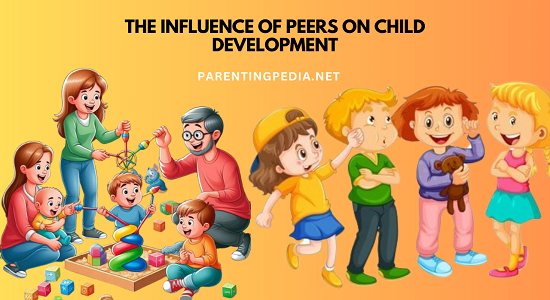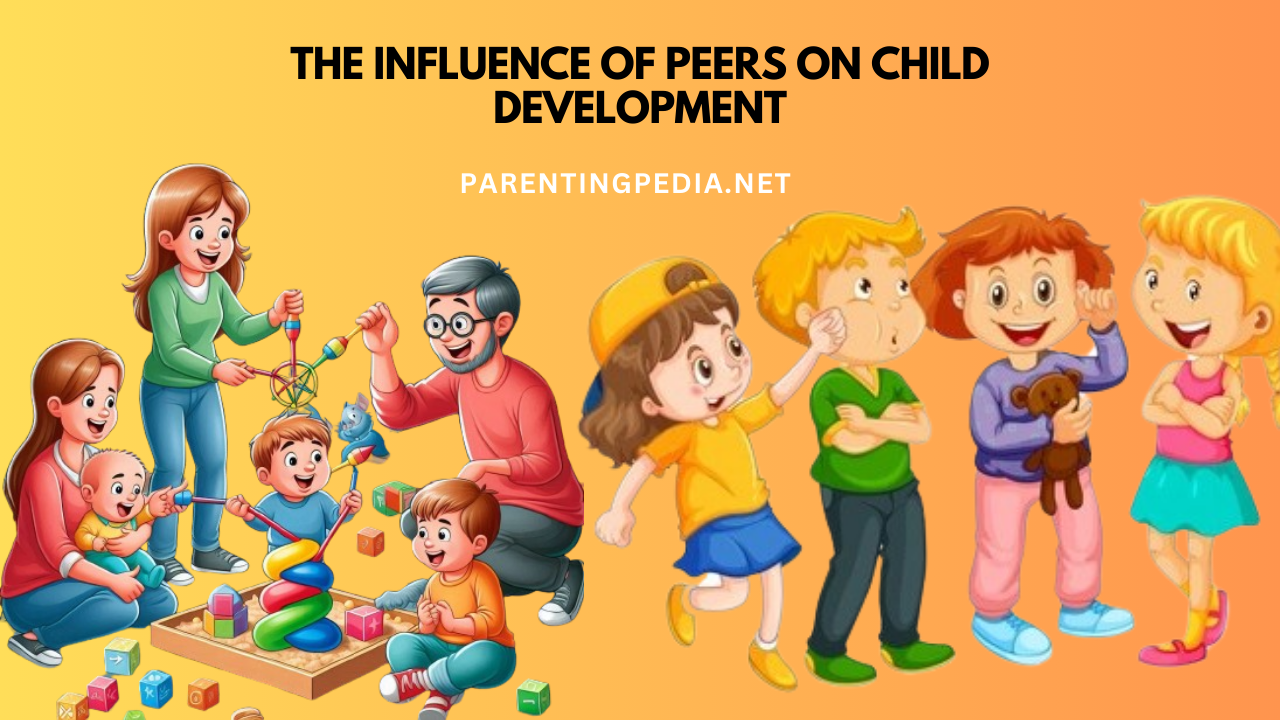Peers or friends play an important role in child development as they help shape behavior, attitude and social skills in children. As children grow, they spend increasingly more time with their peers, and these relationships become important over time in their life. While parents and caregivers provide the foundational support and guidance in a child’s life, peers offer opportunities for learning, social comparison, and the development of a sense of belonging. This article explores various ways in which peers influence child development, the positive and negative impacts of peer relationships, and the importance of promoting healthy peer interactions.
The Role Of Peers In Early Childhood
Social Learning And Imitation: From a young age, children observe and imitate the behaviors of their peers. This social learning is crucial for the development of new skills and behaviors. Through imitation, children learn language, social norms, and problem-solving strategies. For instance, when a child sees a peer sharing toys, they may mimic this behavior, learning the importance of sharing and cooperation.
Play And Cognitive Development: Play is a fundamental aspect of early childhood, and it is often through play that children engage with their peers. Peer play promotes cognitive development by encouraging children to explore, experiment, and engage in imaginative scenarios which help in child development. In group play, children must negotiate roles, follow rules, and solve conflicts, all of which enhance their cognitive flexibility and problem-solving abilities. Furthermore, peer interactions during play stimulate creativity and help children understand the perspectives of others.
The Role Of Peers In Middle Childhood
Social Identity And Group Belonging: As children enter middle childhood, the influence of peers becomes even more pronounced. Peer groups provide a sense of belonging and identity, which is crucial for a child’s self-esteem and social development. Children often adopt the behaviors, values, and interests of their peer group as they seek acceptance and approval. This can have both positive and negative effects, depending on the behaviors and norms of the peer group.
Social Comparison And Self-Esteem: Peers serve as a reference point for children to evaluate their own abilities, appearance, and social status. This process of social comparison can significantly impact a child’s self-esteem. Positive comparisons, where a child feels they measure up well against their peers, can boost confidence and self-worth. On the contrary, negative comparisons, where a child feels inferior or excluded, can lead to feelings of inadequacy and low self-esteem. Peer feedback, whether positive or negative, plays a crucial role in shaping a child’s self-concept and motivation.
Peer Pressure And Decision-Making: Peer pressure is a well-known phenomenon that becomes more notable during middle childhood and adolescence. Children may feel pressured to adapt to the behaviors, attitudes, or choices of their peer group, even if these go against their personal values or the teachings of their parents. While peer pressure is often viewed negatively, it can also have positive effects. For example, peers can encourage each other to succeed academically, participate in extracurricular activities, or engage in helping others. However, negative peer pressure, such as encouraging risky behaviors or bad practices, can have harmful consequences for a child development.
The Role Of Peers In Adolescence
Identity Formation And Self-Independence: During adolescence, peers become central to the process of identity formation. As adolescents seek to establish their own identities separate from their parents, they often turn to their peers for validation and guidance. Peer groups provide a space where adolescents can explore different aspects of their identity, including their interests, values, and social roles. This exploration is critical for developing a sense of self-independence and self-direction. Adolescents may experiment with different peer groups, trying out various social roles and behaviors as they work to define who they are.
Also Read: How Parents Can Help Kids Make Good Friends
Peer Relationships And Emotional Support: Adolescents often rely on their peers for emotional support, sometimes even more than on their parents. Friendships during this stage become deeper and more intimate, with peers providing a sense of understanding and acceptance. These close relationships help adolescents face the emotional challenges of this period, such as stress, identity confusion etc. Positive peer relationships can provide a strong support against the stresses of adolescence, while negative or toxic friendships can increase emotional difficulties.
Positive And Negative Impacts of Peer Relationships In Child Development
Positive Impacts
Social Skills Development: Peers provide a rich environment for practicing and refining social skills. Through interactions with peers, children and adolescents learn important skills such as communication, cooperation, conflict resolution, and empathy. These skills are essential for building and maintaining relationships throughout life.
Academic Motivation: Positive peer relationships can enhance academic motivation and performance. Peers who value education and achievement can encourage each other to study, complete assignments, and engage in extracurricular activities. Peer support can also boost confidence and reduce anxiety in academic settings.
Emotional Support: Close friendships offer emotional support, which is particularly important during times of stress. Having friends who understand and share similar experiences can help children and adolescents cope with challenges and build resilience.
Sense of Belonging: Belonging to a peer group provides a sense of identity and acceptance. This sense of belonging is crucial for self-esteem and emotional well-being. Being part of a group where one feels valued and understood can contribute to a positive self-concept.
Negative Impacts
Bullying And Social Exclusion: Negative peer relationships can lead to bullying, social exclusion, and other forms of aggression. These experiences can have long-lasting effects on a child’s self-esteem, mental health, and academic performance. Children who are bullied or excluded may develop anxiety, depression, and other emotional difficulties.
Negative Peer Pressure: Peer pressure can lead children and adolescents to engage in risky or harmful behaviors such as abuse and violence. The desire to fit in or gain approval from peers can override a child’s better judgment or the values instilled by their family.
Conformity and Loss of Individuality: While social conformity can help children fit into peer groups, excessive conformity can lead to a loss of individuality. Children who feel pressured to conform may suppress their true interests, values, or opinions, which can hinder personal growth and identity development in children.
Promoting Healthy Peer Relationships
Given the significant influence peers have on child development, it is important for parents, educators, and caregivers to promote healthy peer relationships:
Encouraging Open Communication: Open communication between parents and children is key to helping them navigate peer relationships. Children should feel comfortable discussing their friendships and any challenges they may face. Parents can offer guidance, support, and advice on how to handle difficult situations, such as peer pressure or conflicts. By maintaining open lines of communication, parents can help their children develop the confidence to make good decisions in their social lives.
Monitoring Peer Influences: While it is important to give children the freedom to choose their friends, parents should be aware of who their child is spending time with and the influence these peers may have. Regularly talking with children about their friendships and observing their behavior can help parents identify any negative influences early on. Encouraging friendships with peers who have positive values and behaviors can help reinforce the child’s own positive development.

Conclusion
Healthy peer relationships are crucial for the overall development of children and adolescents, shaping their social skills, self-esteem, and identity. As children grow and their peer interactions become more central to their lives, it is important to provide them with the support they need to build positive, supportive, and meaningful connections. In doing so, parents can help ensure that the influence of peers on child development is positive that contributes to their well-being and success.
FAQ
How the child is influenced by his peers?
A child is influenced by peers, where they adopt behaviors, attitudes, and norms observed in their peer group. Peers impact a child’s social skills, self-esteem, and decision-making, often guiding their interests and identity development. Positive and negative peer interactions affect emotional and cognitive growth in child development significantly.
What are the effects of peer influence?
Peer influence significantly shapes a child’s attitudes, choices, and development. It can lead to both positive and negative effects. Positively, it promotes social skills, self-confidence, and motivation. Negatively, it can lead to risky behaviors, conformity, and lower self-esteem if a child feels pressured to fit in.
Remember, the greatest reward of parenting lies in watching
your children soar with love and confidence.
Till then keep smiling and be happy
🎉 Score Freebies by Completing Fun Offers – Start Now!

